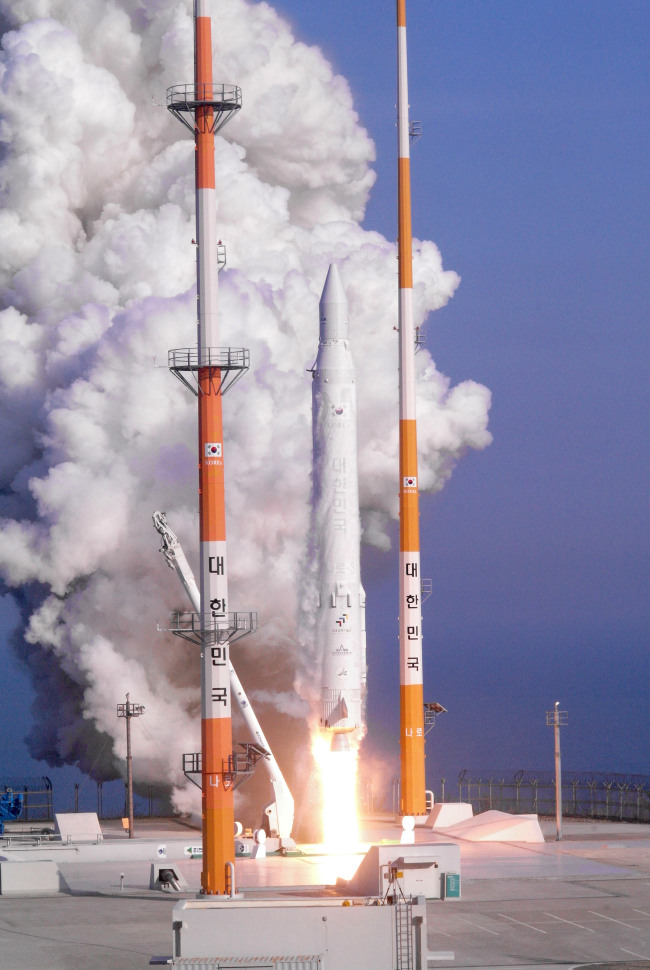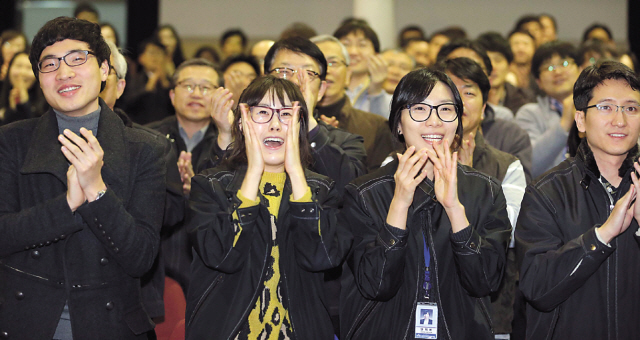Korea makes contact with newly launched satellite
Korea celebrates space rocket success
By Korea HeraldPublished : Jan. 30, 2013 - 20:49
The Korea Aerospace Research Institute announced that it has made contact with the country’s new scientific satellite, completing a mission to send a satellite into orbit for the first time from its own soil.
The satellite first communication contact was made at 3:27:12 a.m., according to officials from the country‘s Satellite Technology Research Center at the Korea Advanced Institute of Science and Technology in Daejeon, 160 kilometers south of Seoul.
Korea on Wednesday successfully launched its first locally assembled space rocket from its own soil for the first time to put a scientific satellite in orbit, sparking nationwide celebration on its status as the newest Asian space power.

The Korea Space Launch Vehicle-1, jointly built by Korean and Russian scientists, blasted off from the Naro Space Center in Goheung, South Jeolla Province, at 4 p.m.
The rocket, also called Naro, put a 100-kilogram Science and Technology Satellite-2C into its target orbit about nine minutes after takeoff, as planned, according to the Korea Aerospace Research Institute, the state-run space program developer.
“The rocket flew as planned and released the satellite 540 seconds after liftoff,” Minister of Education, Science and Technology Lee Ju-ho said, declaring its success.
National leaders including President Lee Myung-bak hailed it as a major milestone in the nation’s development of a space program and its push to gain a foothold in the space industry.
Spectators shouted, applauded and waved national flags as they watched the liftoff from the launch pad on the south coast.
“With this successful launch, we can affirm that the efforts made so far were not a failure, but part of the process toward this success,” Lee was quoted by his spokesperson Park Jeong-ha as saying.
“This is the start of our earnest efforts to open an era of space science. I along with all the people now hope that we can successfully receive the first communication signal from the satellite tomorrow.”

KARI announced that the STSAT-2C satellite transmitted its first signal to a ground station in Norway around 6 p.m., evidencing that it had successfully reached its target orbit.
The ultimate success will be determined when the satellite makes its first contact with the country’s ground station Thursday morning. It is designed to orbit the Earth 14 times a day.
On Wednesday, 54 seconds after the launch, the space vehicle broke the sound barrier, and reached an altitude of 177 kilometers at approximately 3 minutes.
The two fairings at the tip of the upper part of rocket, which caused a problem in its first attempt, were successfully separated as scheduled after 3 minutes, 52 seconds.
Nine minutes after takeoff, the rocket released the satellite at its target orbit, according to KARI.
The Naro is a two-stage space launch vehicle that stands 33.5 meters tall. It has a maximum diameter of 2.9 meters and weighs 140 tons when fully loaded.
KARI, the state-run space program developer, launched in 2002 to build the two-stage Naro rocket in cooperation with Russia to seek its own means to deliver satellites.
Wednesday’s launch was the country’s third attempt to reach orbit for the first time from Korea. The two previous attempts to launch the rocket, in August 2009 and June 2010, ended in failure.
The third launch was originally scheduled to take place in October 2012, but was twice postponed at the last minute for technical reasons.
Authorities say the successful Naro launch is a crucial step for the development of the country‘s space program.
Korea will now launch a new five-year space program, pushing to develop a three-stage indigenous space rocket, the KSLV-2, by 2020.
Seoul is aiming to develop its own three-stage rocket with a budget of 1.5 trillion won ($1.4 billion).
Kim Seung-jo, president of KARI, said after the launch that the state-run agency’s long-term goal is to complete developing a 300-ton thrust engine that can carry the over 1-ton satellite into outer space by clustering several 75-ton thrust engines.
Korea will now launch a new five-year space program to develop an indigenous 75-ton thrust engine by 2018.
The launch came amid growing tension as North Korea faces international sanctions over its Dec. 12 long-range rocket launch and is threatening to conduct its third nuclear test.
(596story@heraldcorp.com)
-
Articles by Korea Herald



![[AtoZ into Korean mind] Humor in Korea: Navigating the line between what's funny and not](http://res.heraldm.com/phpwas/restmb_idxmake.php?idx=644&simg=/content/image/2024/04/22/20240422050642_0.jpg&u=)
![[Exclusive] Korean military set to ban iPhones over 'security' concerns](http://res.heraldm.com/phpwas/restmb_idxmake.php?idx=644&simg=/content/image/2024/04/23/20240423050599_0.jpg&u=20240423183955)



![[Graphic News] 77% of young Koreans still financially dependent](http://res.heraldm.com/phpwas/restmb_idxmake.php?idx=644&simg=/content/image/2024/04/22/20240422050762_0.gif&u=)
![[Herald Interview] Why Toss invited hackers to penetrate its system](http://res.heraldm.com/phpwas/restmb_idxmake.php?idx=644&simg=/content/image/2024/04/22/20240422050569_0.jpg&u=20240422150649)






![[Exclusive] Korean military to ban iPhones over security issues](http://res.heraldm.com/phpwas/restmb_idxmake.php?idx=652&simg=/content/image/2024/04/23/20240423050599_0.jpg&u=20240423183955)



![[Today’s K-pop] Ateez confirms US tour details](http://res.heraldm.com/phpwas/restmb_idxmake.php?idx=642&simg=/content/image/2024/04/23/20240423050700_0.jpg&u=)